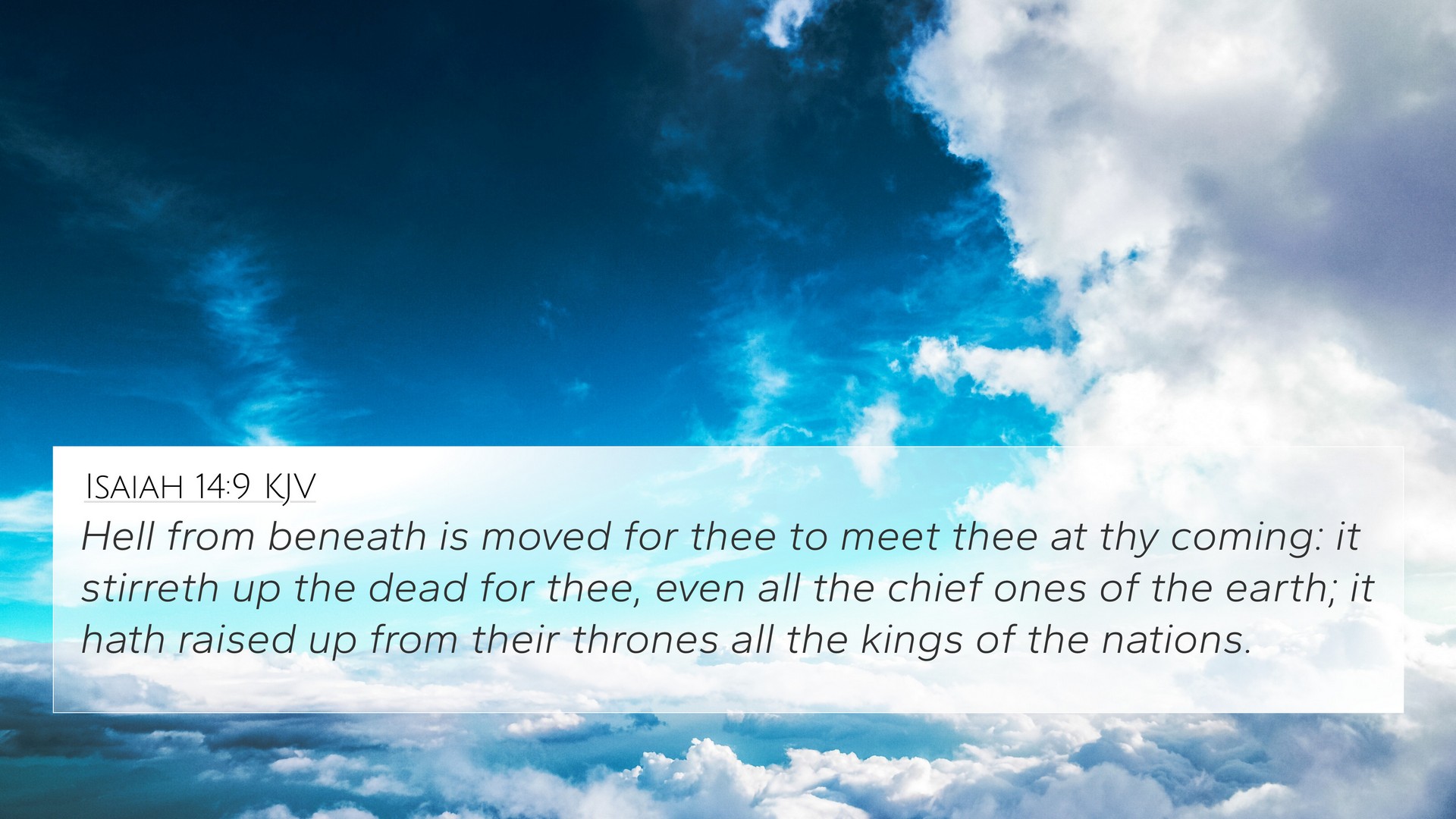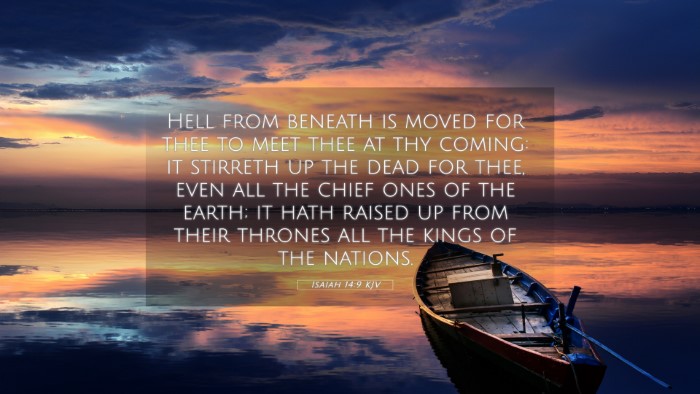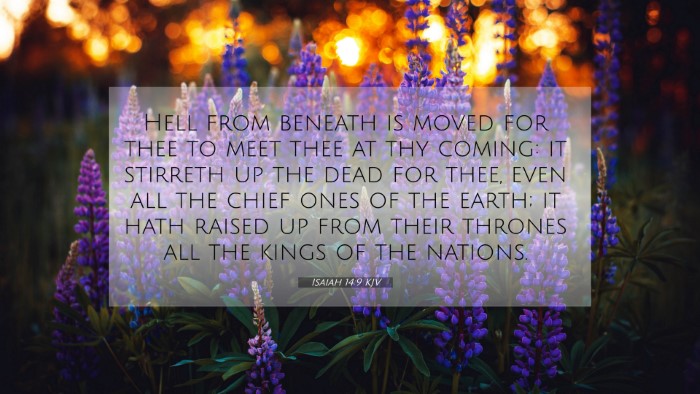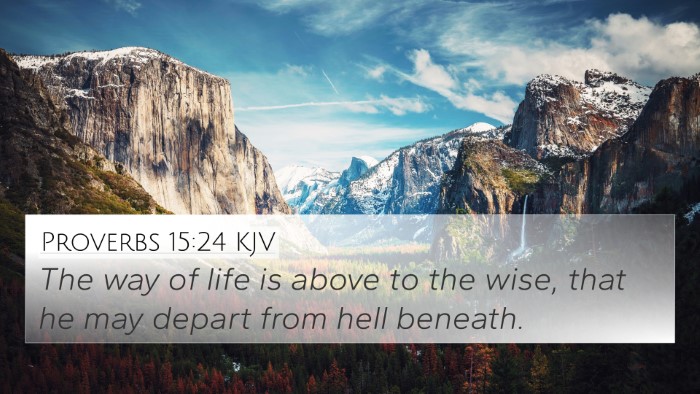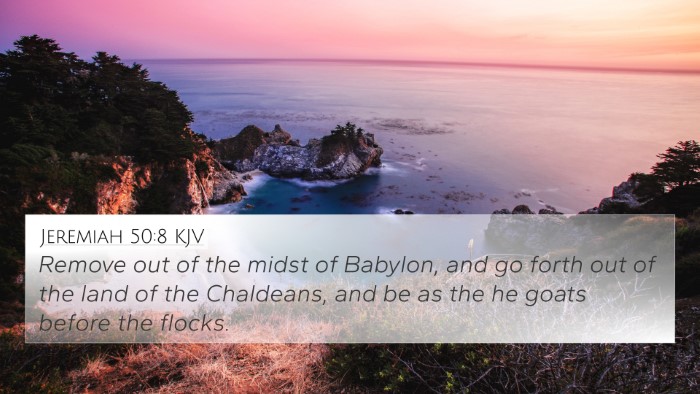Understanding Isaiah 14:9
Isaiah 14:9 states: "Hell from beneath is moved for thee to meet thee at thy coming: it stirreth up the dead for thee, even all the chief ones of the earth; it hath raised up from their thrones all the kings of the nations." This verse is a part of a passage that addresses the fall of Babylon and specifically speaks to the king of Babylon's fate after death.
Summary of Insights
In reviewing the interpretations provided by public domain commentaries, we find several key themes and meanings regarding Isaiah 14:9:
- Descent to the Underworld: The verse describes the immediate reaction of the underworld (or Sheol) upon the death of the Babylonian king, indicating that his arrival is met with a stirring among those who have already died.
- Response of the Dead: The passage emphasizes that the powerful of the earth, the kings and rulers, are gathered and awakened in anticipation of the arrival of this fallen monarch.
- Judgment and Humiliation: Commentators emphasize the theme of divine judgment, showing the ultimate humiliation of the once-mighty king, now reduced to a state of dishonor among the dead.
- Contrast with Honor: There is a stark contrast between the mighty reign the king had while living and the reception he receives in death, which serves as a moral lesson about pride and the fleeting nature of earthly power.
Commentary Insights
Matthew Henry
Matthew Henry notes that this passage serves to illustrate God's justice in bringing down the proud and powerful. It underscores the notion that even the mightiest rulers will ultimately face the same fate as the common man—death and judgment.
Albert Barnes
Albert Barnes elaborates on the imagery of the underworld stirring for the dead king, explaining that it is a metaphorical portrayal of how those who were previously in power will face reckoning after their demise. He emphasizes that the kings raised up from their thrones are a poetic representation of those who once feared him now mocking his plight.
Adam Clarke
Adam Clarke provides a detailed analysis of the significance of the "chief ones" of the earth being disturbed, explaining that this indicates the universal acknowledgment of God's sovereignty over all nations, including Babylon. Clarke connects this to a broader theological theme of accountability in the afterlife.
Cross-References for Isaiah 14:9
- Revelation 20:14: Discusses the finality of death and hell, connecting to the ultimate fate of the king.
- Proverbs 16:18: Highlights the danger of pride, emphasizing how it leads to downfall.
- Ezekiel 32:21-22: Talks about the leaders of nations in the afterlife, paralleling the themes present in Isaiah 14:9.
- Job 3:17-19: Discusses the state of the dead and the equality found in death.
- Psalms 49:14: Reflects on how the wicked are led to destruction in death.
- Ecclesiastes 3:18-21: Talks about the fate of man and animal alike, rooting in the inevitable mortality that connects all.
- Isaiah 37:20: Shows how God's control over the nations can lead to their judgment.
- Luke 16:23: Presents a vivid picture of the afterlife where the dead are aware of their state, linking to Isaiah's theme of recognition after death.
- Philippians 2:10: Discusses the ultimate acknowledgment of Christ's authority over all, reminiscent of kings coming to terms with their powerlessness in the afterlife.
- Mark 8:36: Enforces the message of the futility of gaining the world at the expense of one's soul.
Connections Between Bible Verses
Thematic connections between Isaiah 14:9 and other biblical texts are significant for a deeper understanding. As noted by various commentators, we can identify cross-referencing Biblical texts that further illuminate this verse:
- Exploring Bible verse parallels with passages addressing kingship, judgment, and the humbled state of the mighty (e.g., Job 14:1-2).
- Identification of themes surrounding judgment and the aftermath of pride (e.g., Proverbs 11:2).
- Analysis of the inter-Biblical dialogue between the Old and New Testaments regarding authority and humility.
Conclusion
Isaiah 14:9 serves as a poignant reminder of the consequences of pride and the inescapable judgment that every human faces. Through careful comparative Bible verse analysis and awareness of Bible cross-reference guides, we can gain insightful understandings of this passage and others related to it. The blending of reflections from various commentaries enriches our study, revealing the scriptures' cohesive message about humility, power, and destiny.
